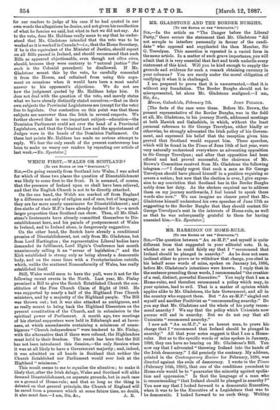WHICH FIRST,—WALES OR SCOTLAND?
LTO Tax EDITOR Or T8R " firacreaos."]
Six,—On going recently from Scotland into Wales, I was asked for which of these two places the question of Disestablishment was likely to come first to the front. It is assumed, of course, that the pressure of Ireland upon us shall have been relieved, and that the English Church is not to be directly attacked.
On the one hand, the Welsh are marked off from England by a difference not only of religion and of race, but of language ; they are far more nearly unanimous for Disestablishment ; and five-sixths of their M.P.'s have already declared for it,—a ranch larger proportion than Scotland can show. Then, all Mr. Glad- stone's lieutenants have already committed themselves to Dis- establishment here, and his parade of postponement of Wales to Ireland, and to Ireland alone, is dangerously suggestive.
On the other hand, the Scotch have already a conditional promise of Disestablishment, not only from Mr. Gladstone, but from Lord Hartington ; the representative Liberal bodies have demanded its fulfilment, Lord Elgin's Conference last month unanimously calling it an " arrear of legislation ;" and the Kirk established is strong only as being already a democratic body, and on the same lines with a Presbyterianism outside, which, unlike the scattered Nonconformity of Wales, has really established itself.
Still, Wales would seem to have the pull, were it not for the following recent events in the North. Last year, Mr. Finlay promised a Bill to give the Scotch Established Church the con- stitution of the Free Church Claim of Right of 1843. He was supported by nearly a half of the Highland Free Church ministers, and by a majority of the Highland people. The Bill was thrown out ; but it was also attacked as ambiguous, and as really meant to bring back the Highland Dissenters on the present constitution of the Church, and in submission to the spiritual power of Parliament. A month ago, two meetings of his clerical supporters were held in Edinburgh and at Inver- ness, at which amendments containing a minimum of unam- biguous " Church independence" were tendered to Mr. Finlay, with the alternative that if these were refused, the Highlanders must hold to their freedom. The result has been that the Bill has not been introduced this Session,—the only Session when it was at all likely to have a Government majority ; and, indeed, it was admitted on all hands in Scotland that neither the Church Established nor Parliament would ever look at the Highland " minimum."
This result seems to me to equalise the situation ; to make it likely that, after the Irish deluge, Wales and Scotland will alike demand Disestabliahment, on separate grounds, but in each case on a ground of Home-rule ; and that so long as the thing is debated on that general principle, the Church of England will be saved from a pressure which at some future time, no doubt, it also must face.—I am, Sir, &c., A. B.


































 Previous page
Previous page